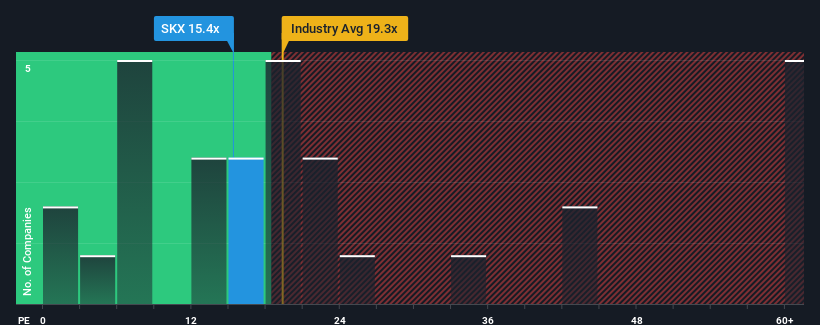- United States
- /
- Luxury
- /
- NYSE:SKX
Investors Continue Waiting On Sidelines For Skechers U.S.A., Inc. (NYSE:SKX)

When close to half the companies in the United States have price-to-earnings ratios (or "P/E's") above 20x, you may consider Skechers U.S.A., Inc. (NYSE:SKX) as an attractive investment with its 15.4x P/E ratio. Nonetheless, we'd need to dig a little deeper to determine if there is a rational basis for the reduced P/E.
Recent times have been advantageous for Skechers U.S.A as its earnings have been rising faster than most other companies. One possibility is that the P/E is low because investors think this strong earnings performance might be less impressive moving forward. If not, then existing shareholders have reason to be quite optimistic about the future direction of the share price.
Check out our latest analysis for Skechers U.S.A

What Are Growth Metrics Telling Us About The Low P/E?
Skechers U.S.A's P/E ratio would be typical for a company that's only expected to deliver limited growth, and importantly, perform worse than the market.
Taking a look back first, we see that the company grew earnings per share by an impressive 19% last year. The strong recent performance means it was also able to grow EPS by 64% in total over the last three years. So we can start by confirming that the company has done a great job of growing earnings over that time.
Shifting to the future, estimates from the analysts covering the company suggest earnings should grow by 15% each year over the next three years. With the market only predicted to deliver 11% per annum, the company is positioned for a stronger earnings result.
With this information, we find it odd that Skechers U.S.A is trading at a P/E lower than the market. It looks like most investors are not convinced at all that the company can achieve future growth expectations.
The Bottom Line On Skechers U.S.A's P/E
Using the price-to-earnings ratio alone to determine if you should sell your stock isn't sensible, however it can be a practical guide to the company's future prospects.
We've established that Skechers U.S.A currently trades on a much lower than expected P/E since its forecast growth is higher than the wider market. When we see a strong earnings outlook with faster-than-market growth, we assume potential risks are what might be placing significant pressure on the P/E ratio. It appears many are indeed anticipating earnings instability, because these conditions should normally provide a boost to the share price.
The company's balance sheet is another key area for risk analysis. Take a look at our free balance sheet analysis for Skechers U.S.A with six simple checks on some of these key factors.
Of course, you might find a fantastic investment by looking at a few good candidates. So take a peek at this free list of companies with a strong growth track record, trading on a low P/E.
New: Manage All Your Stock Portfolios in One Place
We've created the ultimate portfolio companion for stock investors, and it's free.
• Connect an unlimited number of Portfolios and see your total in one currency
• Be alerted to new Warning Signs or Risks via email or mobile
• Track the Fair Value of your stocks
Have feedback on this article? Concerned about the content? Get in touch with us directly. Alternatively, email editorial-team (at) simplywallst.com.
This article by Simply Wall St is general in nature. We provide commentary based on historical data and analyst forecasts only using an unbiased methodology and our articles are not intended to be financial advice. It does not constitute a recommendation to buy or sell any stock, and does not take account of your objectives, or your financial situation. We aim to bring you long-term focused analysis driven by fundamental data. Note that our analysis may not factor in the latest price-sensitive company announcements or qualitative material. Simply Wall St has no position in any stocks mentioned.
About NYSE:SKX
Skechers U.S.A
Designs, develops, and markets footwear, apparel, and accessories worldwide.
Excellent balance sheet with acceptable track record.
Similar Companies
Market Insights
Community Narratives



